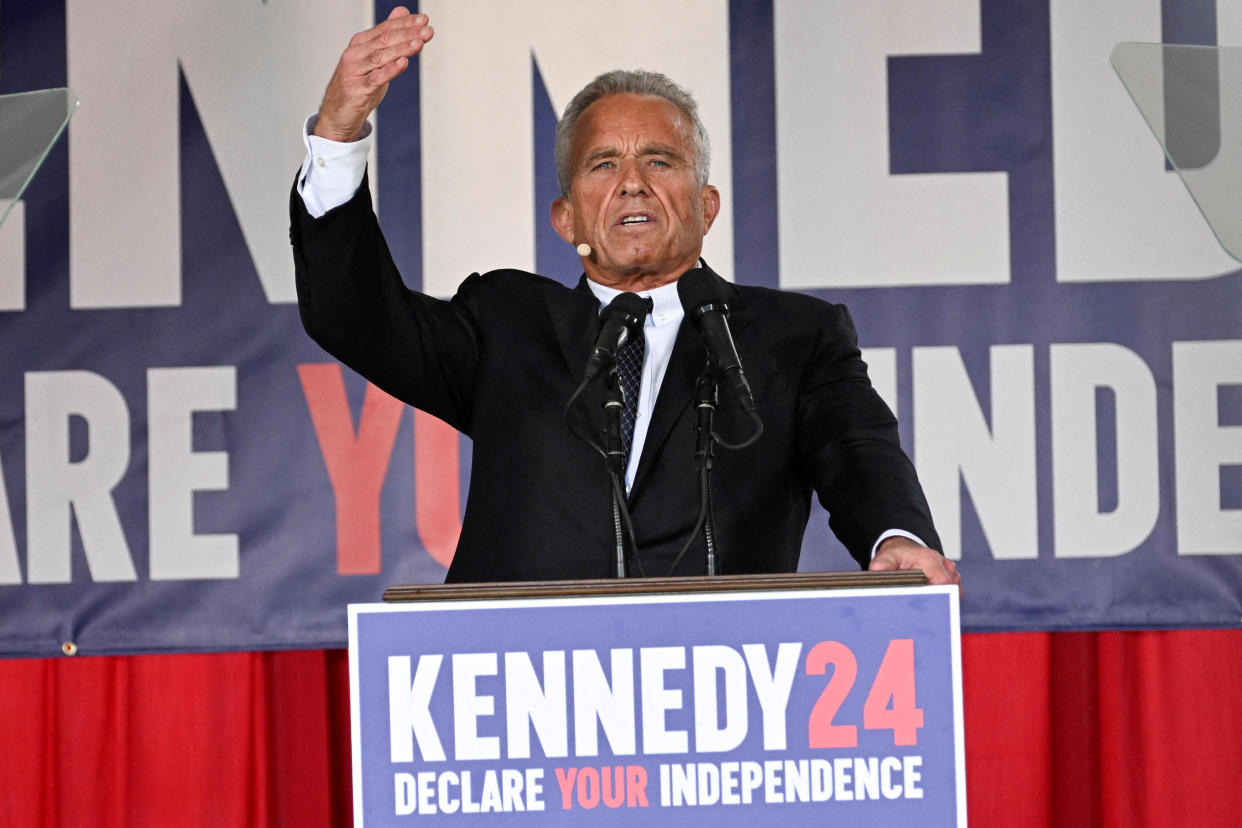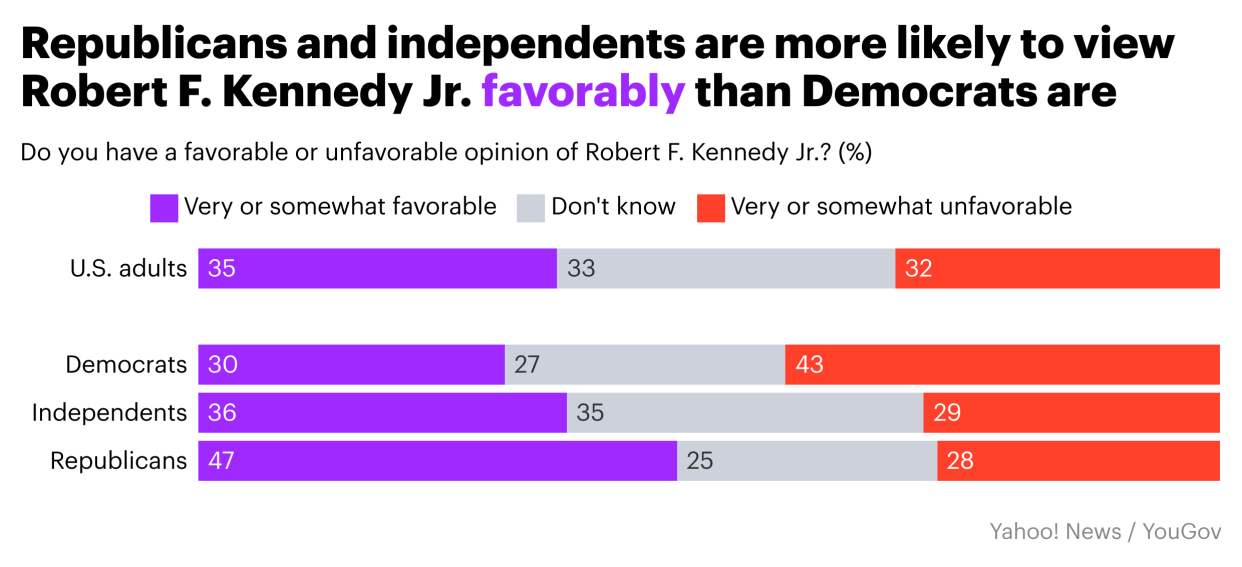New poll shows Robert F. Kennedy Jr. might not hurt Trump or Biden in 2024

A week after former Democratic candidate Robert F. Kennedy Jr. announced his independent bid for the presidency, a new Yahoo News/YouGov poll suggests that his impact on the 2024 election could be smaller than initially predicted — or feared.
The survey of 1,675 U.S. adults, which was conducted from Oct. 12 to Oct. 16, found that Kennedy’s presence in the race made no measurable difference in President Biden’s slim lead over former President Donald Trump.
Without Kennedy factored in, Biden (44%) edges Trump (43%) by a single percentage point among registered voters. With Kennedy included as an independent, Biden is ahead by the same margin, 40% to 39%. Kennedy draws 9% of the vote.
A spoiler candidate?
When Kennedy first dropped out of the Democratic primary to run as an independent, pundits on both ends of the political spectrum said he might play the spoiler, either drawing votes from Biden because of his famous name and populist rhetoric or stealing support from Trump because of his anti-vax views.
The Yahoo News/YouGov poll shows that Kennedy — a longtime environmental lawyer turned prominent conspiracy theorist — might instead pull from both sides equally.
In a one-on-one matchup, Biden leads Trump by 81 points among Democrats in the poll, Trump leads Biden by 81 points among Republicans, and Trump leads by 6 points among independents.
In a three-way race, Trump’s lead among independents shrinks by 2 points, his lead among Republicans shrinks by 4 points, and Biden’s lead among Democrats shrinks by 3 points.
Kennedy winds up with 9%, while Biden continues to lead by 1 point overall.
To be sure, 9% — which would translate into the most votes for a third-party candidate since Ross Perot in 1992 — is nothing to sneeze at. In a polarized political climate in which presidential elections hang on just a handful of ballots in a handful of battleground states, every vote could conceivably make a difference.
Kennedy could attract even fewer voters
Yet even Kennedy’s 9% might be overstating his actual support.
To test this theory, Yahoo News and YouGov asked respondents — before providing Kennedy as an option — to choose between Trump, Biden and “another candidate,” with a prompt to type in the name of their preferred alternative.
A mere 1% of registered voters said they preferred another candidate and typed Kennedy’s name.
Instead, most of those who selected the “another candidate” option — 9% overall — entered the name of a Republican challenging Trump for the GOP nomination (4%) or a past Democratic candidate (2%) such as Sen. Bernie Sanders or Transportation Secretary Pete Buttigieg. Nearly all the rest (about 2%) either specified a preference for “anyone else” or left the space blank.
Recommended reading
The Hill: Billionaire linked to Clarence Thomas donated to Cornel West's campaign
Yahoo News: House speaker chaos: New poll shows Americans increasingly blame Republicans for dysfunction in Congress
Yahoo News:Poll: Americans' sympathies shift sharply toward Israel in early days of Hamas war
“This far out, especially given the wide gulf between Kennedy’s open-ended (1%) and prompted (9%) support, the former is likely a better measure of those currently planning to vote for Kennedy than the latter,” explains YouGov pollster Mark Blumenthal, who partners with Yahoo News on its surveys.
In other words, garnering 9% support in a race against Trump and Biden might be the best-case scenario for Kennedy, and right now it appears he’s more on track to get just a tiny sliver of the vote.
Digging into the numbers
Kennedy’s prompted support is highest among independents (15%), voters age 18 to 44 (15%), 2020 nonvoters (15%) and those who opted for “another candidate” on the previously described question (41%). As such, that support may be better understood as an expression of unhappiness with the prospect of a Trump-Biden rematch — particularly among those less likely to vote — than as an authentic affinity for Kennedy’s candidacy or agenda.
Kennedy still enjoys certain advantages over other third-party hopefuls. He has generated meaningful name recognition, for instance, with 35% of Americans expressing a favorable opinion, 32% expressing an unfavorable opinion and just 33% saying they don’t know who he is.
It’s also worth noting that Kennedy’s rating is far more positive among Republicans (47% favorable, 28% unfavorable) and 2020 Trump voters (48% favorable, 28% unfavorable) than among Democrats (30% favorable, 43% unfavorable) and 2020 Biden voters (26% favorable, 52% unfavorable) — which implies that he may have more opportunity to grow his support on the right than on the left.

In contrast, far fewer Americans are familiar with 2024’s other third-party possibilities: progressive activist Cornel West (14% favorable, 22% unfavorable) and the centrist No Labels organization (13% favorable, 19% unfavorable), which is seeking to field a bipartisan “unity ticket.” Not a single respondent who said they preferred “another candidate” to Trump or Biden went on to mention West or No Labels.
More headwinds for Kennedy
Ultimately, Kennedy may have trouble gaining enough traction with mainstream voters to affect the election. Without mentioning his name, the new Yahoo News/YouGov survey tested five specific arguments Kennedy has made. All generate more disagreement than agreement. At most, just a third of Americans agree with Kennedy’s false views that COVID-19 vaccines are more harmful than the virus itself (32%) and that climate change is being used as a pretext for imposing totalitarian controls on society (33%).
Far fewer agree with Kennedy’s claims that Prozac and other antidepressants have led to a rise in school shootings (23%); that vaccines cause autism (17%); and that chemicals in the water supply could turn children transgender (7%).
____________
The Yahoo News survey was conducted by YouGov using a nationally representative sample of 1,675 U.S. adults interviewed online Oct. 12-16. The sample was weighted according to gender, age, race, education, 2020 election turnout and presidential vote, baseline party identification and current voter registration status. Demographic weighting targets come from the 2019 American Community Survey. Baseline party identification is the respondent’s most recent answer given prior to March 15, 2022, and is weighted to the estimated distribution at that time (32% Democratic, 27% Republican). Respondents were selected from YouGov’s opt-in panel to be representative of all U.S. adults. The margin of error is approximately 2.7%.





